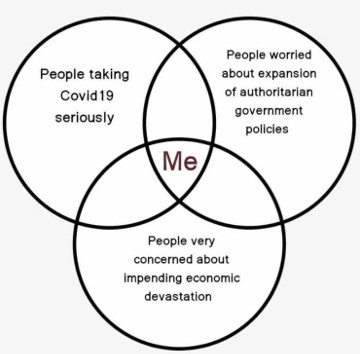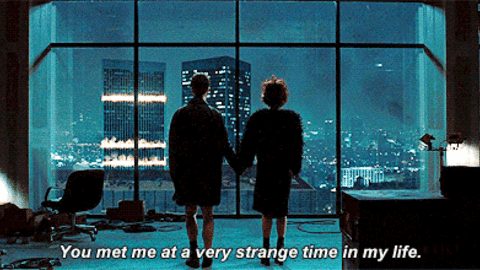I started to write this text in the Christmas holidays. It has proved very difficult to finish, let alone publish it. I think this is due to how much the issue has been politicised and become emotionally charged (something we have seen all too much in recent years with other topics).
A curious thing: While I am locked down in the UK, I have been ‘locked into’ the discussion in Germany, and other German-speaking countries, much more than here. Maybe it is there where I see the most discrepancy between the problem at hand, the virus, and the political response. There is a holding on to the hard lockdown, changes in law in the wake of it, and a supression of dissenting voices that astounds me. I have friends in the country who feel the same way. At some point it becomes difficult to still believe in good intentions.
In recent phone calls with my sister, we have been talking a lot about the current virus-induced crisis. We try to not let the topic dominate the whole conversation, but it can be difficult to find any areas of our lives that are not affected by it. Fortunately, we can talk completely factually and without animosity. We both simply want to make sense of what is happening and exchange our thoughts.
I am the one who consumes far more information on it and then pass on things that stood out for me. My sister is the one who actually had Covid. She caught it while in a care facility, recovering from a horrible car accident that she and my mum were involved in with no fault of their own. On top of the illness itself which took the course of a bad cold, once tested positive she had to stay in isolation for six days (transport home could not be arranged earlier), not allowed to leave her room even for walks, food brought in three times a day, no social contact otherwise. She arrived home in a taxi, the driver wearing PPE, and her suitcase laminated. Then of course she had to self-isolate more, but compared to the clinic her small appartment seemed “a palace”.
This is about how I have perceived the C-19 crisis, especially after spending three weeks in Germany in September, following the accident mentioned above. Something flipped during that time. And since then there's a tension between what I am told is the morally right thing to believe and follow, and the many misgivings I have about the political decisions and rhetoric around the virus. And here it is especially the German (and the regional Bavarian) government that I have developed the most distrust in.
If I had to pin it to one particular moment, it was when I became aware of children having to wear masks during class, and how quickly this decision was made, without much evidence of its necessity or usefulness. For me and other parents, doctors among them, this is a horrible idea, still I had to learn that we are a minority.
Masks don't help, do help, never harm
My family, like almost everybody else I know, had got well through the four months of lockdown and restrictions. Some aspects had been enjoyable even. Long walks and bike rides, the excitement of a trip to the Forest of Dean, after 9 weeks of the car sitting unused.
News regarding the pandemic had gradually got better. From end of March, the numbers of deaths dropped. Efforts to develop a vaccine had started. I saw a tweet about Czech people sewing masks for everybody, alongside a report that masks could actually make a difference — in contrast to the previous message so frequently repeated: A mask won't help you. Now the news was, it can help others. We can help each other. That sounded great. Several weeks later Austria, then Germany, made wearing masks in shops mandatory. Britain eventually followed. Overall, restrictions were eased.
But then — this must have been in July — there was some news around masks that stunned me. In Germany, some schools were reopening again. And in some, school children would have to wear masks during the entirety of the lessons.
When in Germany, I heard some personal accounts where it looked like only older children had to wear masks, and only for 9 days at the start of the school year. But after the autumn half-term it included primary children, for an indefinite time, based on a completely arbitrary value of 50 new positive cases per 100 000 a week.
A bit later I read about pupils having to wear masks during P.E., even outside. My brother confirmed this, a colleague had a daughter that had to play basketball with a mask on. “Every now and then they can have a break to catch breath. — It's sickening.”
 What used to be things kids do, is now… FALSCH — wrong
What used to be things kids do, is now… FALSCH — wrong
Around that time I noticed a friend's WhatsApp statuses where she was posting links that were full-on about how the measures were wrong and the danger from the virus exaggerated. One day a photo from a protest march in Berlin popped up. Had she been there? Woah, hang on, she is with those people who are against measures and against wearing masks? I also thought some of the links were quite dubious.
Scientific misfits
Then I learned about Sucharit Bhakdi, a professor and medical doctor specialised in microbiology and infection epidemiology who had been head of the Microbiology department at Uni Mainz for 20 years. Bhakdi wrote an open letter with
five questions to Angela Merkel, which he also posted as a video on his (now deleted) Youtube channel. Bhakdi also wrote a book called
Corona Fehlalarm? (published in English on 2 Octobre 2020 as
Corona False Alarm?), together with his wife, herself a professor and cell biologist.
Whatever you might think of their conclusions, you can't deny the two a profound subject knowledge, and there is a lot of useful information in it. It is also clear that this was a personal matter to them.
Yet Bhakdi was quickly dismissed by the German media, never invited to any talkshows (he has been appearing on an Austrian private channel, ServusTV), and even labelled a conspiracy theorist. I believe though that his questions were valid.
Other highly decorated scientists were not
de facto banned, but the interviewers distanced themselves from them after the interview. This happened to Karin Mölling, a virologist and former professor and director of the Institute of Medical Virology at Zürich University, when she was
interviewed by RadioEins on 14 March 2020 (German). She said there was a danger in becoming too panicked. Imagine you give an interview and then the interviewer has to publish how they find it cynical that you compared Covid deaths to other causes. I had not come across anything like that before.
Staying in Germany, another scientist worth mentionining is Hendrik Streeck, head of Virology and HIV Research at the univeristy of Bonn. He conducted a study on a population that experienced a
super-spreader event quite early on. While not directly opposing the government strategy he has time and again tried to counter the over-dramatisation and suggested moving from too many restrictions to trusting in people to behave responsibly, and let businesses develop their own hygiene strategies.
In the UK and US, among those having a hard time going against the general consensus, there are the authors of the
Great Barrington declaration, and in the US also Stanford professor of medicine and of epidemiology and public health, John Ioannidis. Ioannidis had been in favour of a hard lockdown as long as not much was known about the virus. His post
"A fiasco in the making?" is remarkable for what he says about coronaviruses in general, “even some so-called mild or common-cold-type coronaviruses that have been known for decades can have case fatality rates as high as 8% when they infect elderly people in nursing homes. In fact, such “mild” coronaviruses infect tens of millions of people every year, and account for 3% to 11% of those hospitalized in the U.S. with lower respiratory infections each winter.” I only just read that.

What do positive PCR tests tell us?
There was going to be a whole section here on things I read about the virus, explanations on why the death toll was especially high in particular countries, the questionable treatment with toxic doses of hydroxyquinolone as part of international studies in March 2020, the possiblity of cross immunity from other coronavirus infections.
But I don't want to go down that road, it would be very lengthy and also very easy to get things wrong. The one thing that keeps coming up though and which puzzled me from early on, is the role of the PCR (polymerase chain reaction) test.
The PCR is very good and accurate at detecting fragments of the virus, but it can't say if a person is ill or infectious, especially at the high number of cycles suggested in the original protocol. This is something that was never clarified when rising infection numbers were shown last summer. — It was also not shown how many tests had been done in total. This struck me as very unscientific. Besides that, no other pathogen has ever been tracked in this way. We don't have any comparable numbers to put it in context.
What is presented as active cases is a very inaccurate approximation of what is happening. The one sure thing you could say was that the virus was spreading. And that is something we knew quite early on, when we were told that the virus could not be contained anymore, and the goal now was to “flatten the curve”.
I am curious what will become of various intiatives that are addressing the inaccurateness, including court cases. There has been one
ruling in Portugal where a positive PCR test on its own was not seen as sufficient to warrant quarantine.
So much has been hinging on this PCR test. How many people have been sent into quarantine for nothing, how many scare stories beamed into living rooms and minds daily, — “record daily number of new infections” and so on? My friend once sent me a link to a TV clip with a presenter standing in front of a map of Germany where everything was red, reading out case numbers as if they were Bundesliga scores. What do we need this kind of presentation for?
Strategy of fear
In Germany, in terms of deaths so far, it looks like the measures were justified. But if you look at how many old people had to die in isolation, how many other essential healthcare was not provided; the things that young people have been burdened with, what experiences and opportunties have been taken from them; and how many livelihoods (and lives — by suicide or stress-induced deaths and delayed or cancelled medical interventions) have been destroyed, I believe it is not so clear anymore.
There is a strange imbalance where the danger from the virus and how contagious it is, had to be painted in the worst immaginable way, but any damage from measures was a purely economical challenge and could be solved by distributing money. There even is a
strategy document by the ministry for the interior that makes suggestions about how people should be made fearful. In one section it states that the infection fatality rate is not the right variable to present to people — it is too low. Instead the consequences of a worst case scenario had to be communicated in the most dramatic ways. “To achieve the desired shock effect, the concrete effects of a contamination of the population must be made clear.” A list follows: How a relative could be refused by the hospital and sent back to die a turtorous death at home. How children can become responsible for the death of a parent (!) and how people could suffer from long-term syptoms even when the main illness was over.
If you asked a doctor what would be the first thing to do when you had to break the news of a serious illness, they would probably say “You have to calm the patient down, and say something reassuring.” You would not try to make them take their medicine by scaring them to death.
But apparently with whole countries that is different. People would just not do as they are told, as friends have argued.
The way things have been managed, a significant (and possibly growing?) part of the population has been alienated. Hundreds of thousands of them came to Berlin on the 29th of August and demonstrated. And you know what, I completely understand them. I have heard so many times how irresponsible these people are, but in fact these demonstrations are happening in fresh air and the risk of infection is minimal. According to Streeck (who is not a defender of the “Querdenker” at all!) no rise of infections has been seen as consequence of this.
Imagine a government cuts down on your rights and freedom for a much longer time than initially declared, keeps making decisions just by executive power, not consulting the parliament, eventually even changes “infection protection law” in very curious ways, and nobody protests. You might be too busy with other things, but I think there is something to be said for some people actings as the country's immune system.
The right (herd) immunity
Talking of the immune system.. this was not a term you heard very often in the first 9 months of the pandemic from any government channels. The main message was to stay at home. No Vitamin D, no fresh air, no team sports or working out in a gym.
Also, while at first anybody who dared to mention herd immunity, especially the authors of the Great Barringtion declaration, was immediately villified, this term has now been rehabilitated, because now we have vaccines.
Letting infections contribute to herd immunity is not acceptable, this has to be the priority of the vaccine. The vaccine was also the only possible way out of the restrictions. It was almost as if we had to be prepared for the vaccine, it was strictly not allowed for people to risk an infection at all.
There is a whole lot one could say about the vaccine. I say “one”, but it will not be me. Even after having read/listened to a lot about the matter, I am in two minds about it (not about having a vaccine, but the rushed development). There are a lot of scientists wo are very optimistic about the vaccines (including Karin Mölling whose eyes seemed to light up when she talked about them; and she has worked on vaccine development herself, for HIV, which has so far been doomed because of the mutability of the virus).
On the other side, there is no doubt that having several phases of clinical research run in parallel is not the only reason why it was quicker. There is no long-term data, and apparently pharmacological, pre-clinical data are missing too. There have been several, again, renowned people, warning about unknown consequences. (A vaccine against Swine flu in 2009 caused cases of narcolepsy — a condition where people can be excessively sleepy during the day and fall asleep involuntarily).
I think this
article by William Haseltine is worth reading as it touches many important points.
I think even people excited about the vaccine have to admit that what is happening now is pretty experimental. But maybe that is the point. There are several candidates that have been admitted already, and there are around 200 altogether.
News from Absurdistan
I had hesitated to join Telegram, mainly because WhatsApp and Slack were already grabbing too much of my attention. I am glad I did though. There's a lot of valuable information to find there, and I am quite up to date about developments in Germany and Austria. Perhaps Austria the most actually.
This is due in no small part to the channel “Corona & Psychologie”. It is run by Vienna-based pychiatrist Raphael Bonelli, who used to give tips on couple's relationships. At some point after March 2020 the focus shifted.
Bonelli has a younger side-kick called Thomas Breit who for a while did a video diary, where he started his entries with: “Dear diary, this is so future generations might see what is currently possible in Absurdistan… err… Austria” followed by reports of the latest political blunders like deciding to open ski lifts during lockdown and then being surprised they get overcrowded.
As for Bonelli himself, a term he has been using a lot is “deescalation”. That's something he wants to contribute to. In his view, there's these opposing tendencies in people: They are either
Gesundheitsapostel (health preachers) or
Freiheitskämpfer (freedom fighters), and they have to understand and respect their different priorities. Another thing I liked was his appeal not to moralise. That is such good advise. I'd say this is the main disease of our times — or almost all times?? — People thinking they can pass moral judgment on others. Thinking they know what is morally right.
The other day I saw an article in the Times where a professor Montgomery was quoted talking to Times Radio: “Anyone who doesn't wear their mask, they have blood on their hands. They are spreading the virus.” Erm.. excuse me. I have just spent 9 months in a more or less pronounced state of separation from almost everybody, I am pretty sure I don't have the virus, so it is already factually wrong that I am spreading it. But for you, if I dared to take my mask off, I am a… killler?
Honestly, isn't this absurd? But I am sure this is a message that is lodged into people's brains when they read it.
In a talk I heard recently, the speaker, Daniele Ganser, argued: You cannot read or hear something without it going into your brain. It's different from food where you can look at it and choose whether you want to eat it. If you read something, it goes into your brain. His appeal is “Don't believe everything you think.” which I quite like. Another thing to acknowledge is that you will always be manipulated. You can only choose who or what you want to be manipulated by.
But the facts, it is about facts! It is about science, our leaders say. We are following the science. The science. We have seen this one science and it has shown us the path. No other path is thinkable.
Irreversible change
However bad this virus is, even if you were extremely scared of it, you'd have to admit that the crisis is not
just the virus. There is a crisis of communication, a crisis of trust.
I refuse to accept that a different way wouldn't have been possible. We have followed the example of China with the lockdown. It would have been unthinkable to do it that way some years back, and if I remember right the WHO used to say that lockdowns are not an appropriate means of control. Karin Mölling kept emphasising how bad a curfew would be, and that you could do it for one or two weeks maximum.
Also, the communication could have been different, a less fear-based one.
Some people I talked to seem to believe I want to deny the potential danger of the virus. But really, my concern is independent of that. It is that our fundamental rights are being eroded and that livelihoods, and lives, are being destroyed.
From when I have talked to people who agree with their government's measures , I get the impression they simply cannot believe that the government could do wrong by them (talking of the German one here; with the UK one, the complaint is usually that they did not act quickly enough, though with vaccinations it looks the other way round…). They can neither see it influenced by third party interests, nor having good intentions but getting things wrong. Instead they say “I would not like to be in their place. I am glad I don't have to make these decisions.” I am not very good at making decisions, but in this case, I think we should still have some say about how to live our lives. And contrary to those friends, I think most people can be trusted to do the right things.
I've heard two good statements about freedom recently. One is that freedom does not mean that you can do what you want but that you don't have to do what you don't want to. The other was by a comedian, Roland Düringer, saying that to him freedom had a lot to do with taking responsibility for your own life, not simply doing whatever you want.
Eigenverantwortung.

Moving on
I believe it is a fallacy to think the only mistake that can be made is to do too little. That the cure could not be worse than the disease. And curiously, we might even have done too little, too. Too little to protect the elderly in nursing homes. Too little focus on other diseases but just the one.
Lockdown and vaccines seem to be the only approaches we've got.
And we seem to have opposing sides busy to prove each other wrong, with lots of snark and vitriol, rather than learning from each other. I was a target of snark when I said to a friend, one of the pillars of dealing with the virus should be to strengthen our immune systems. This is not even acceptable to say anymore apparently.
I think I generally want to hold different possibilities and explanations in my mind, and that can be difficult to understand.
The WHO declared a pandemic before, in 2009. It was about the H1N1 influenza strain, or Swine Flu. There seemed to be a rapidly growing number of cases in Mexico and then in other countries, too. A German doctor and member of parliament made his own investigations and came to the conclusion that the threat was blown out of proportion, which
turned out to be true. By that time pharma companies had sold millions of anti-flu treatments and vaccines. As mentioned above, one vaccine caused cases of narcolepsy.
Now this time it is different and it is recognised that there is a pandemic going on. And still, as back then, third party interests will shape things, and I sometimes wonder if they have, even if not explicitly stated, pushed in the direction of lockdown. But I cannot know that. And of course you can argue, so what, if lockdown is the right thing to do.
I think it is not a good choice, it is like chemotherapy, but one that does not attack the tumor. The virus is not the tumor.
And yet for now I just have to let it be, I don't have a good way to fight against it, and in the end, in the given moment, it might be all we can do.
As a friend here in England said, the important thing might be to make sure afterwards it won't happen again. I hope I will be able to contribute to that.
slightly edited 24/03/2021




